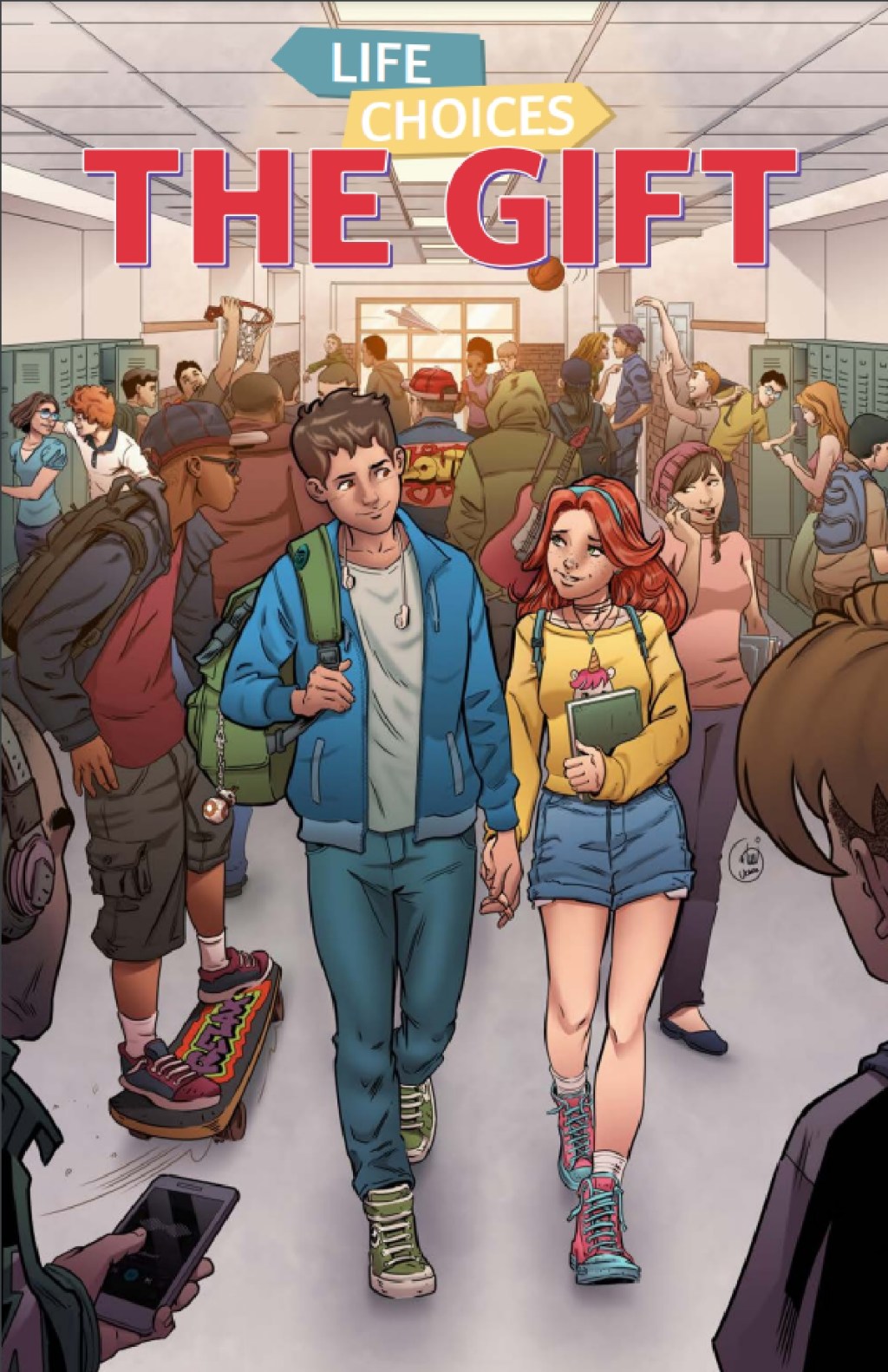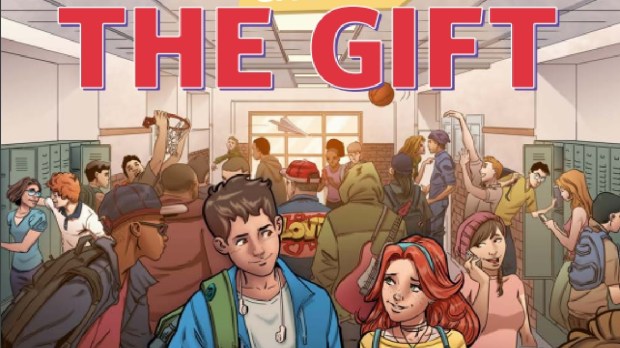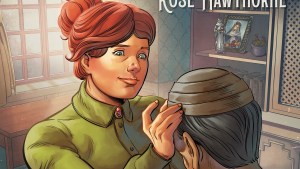Lenten Campaign 2025
This content is free of charge, as are all our articles.
Support us with a donation that is tax-deductible and enable us to continue to reach millions of readers.
A new graphic novel is offering parents, teachers, youth group leaders, and pastors an altogether unique way to relate a life-affirming message to pre-teens and teens while equipping them to think critically about their life choices. Titled The Gift, this 36-page full-color graphic novel is a gripping tale dramatized by using realistic elements that show the struggles of adolescent pregnancy and the real-life choices that such an occurrence will require.
The story follows the lives of Josh and Casey, two high school students who began dating after growing up as childhood friends. To celebrate Josh’s birthday, Casey decides that her “gift” will be to share their first sexual experience together. However, neither of them consider that contraception might fail. Soon after, Casey reveals that she is pregnant and that’s when The Gift really begins.
After that fateful night the story, much like the lives of the two protagonists, completely changes. The Gift becomes a “choose-your-own-adventure” story, in which readers can decide if Josh and Casey will choose abortion, adoption, or parenthood. Each path will lead readers down a realistic and emotional scenario that shows the consequences of their choices and the possible futures where they may lead.
Produced by LifeCanada National – a life-affirming association that promotes, protects, and advocates for human life at all stages – in partnership with Voyage Comics,The Gift is designed to get kids thinking about their choices and the real life repercussions. Complete with high quality art and a guide to group discussion, this graphic novel has enormous value as a teaching resource.
Aleteia had a chance to interview Pat Wiedemer, Executive Director of LifeCanada National, who spoke to us about the choices that went into The Gift:
LifeCanada National is a life-affirming charity that promotes pro-life values and educates on pro-life issues. How will this new graphic novel fit into your works?
Wiedemer: The effort to reach the next generation with the message of life is a challenge that requires ingenuity and utmost creativity to counter the extreme force of the anti-life trends of our day. After reviewing many of the more familiar methods of the pro-life movement, we had to admit that they were not having the impact we hoped: neither from the point of view of educating the youth nor from the point of growing in support for the movement.
To offer a new insight, we wrote a story that reflects the actual choices youth have concerning an unplanned pregnancy and we coupled it with the option of choice for the ending. What’s more we insisted on superior graphics so it can compete with the top-of-the-line graphic novels on the market. The idea of writing a graphic novel is totally different from what has been done to reach the next generation, but the graphic novel is the primary method of how youth read. If you want to enter their world, either one must use video as the tool, or the graphic novel.
The Gift is the first in our proposed series of Life Choices dealing with life and death decisions facing our youth: stories that make the reader think about the truth, value and dignity of all life.
The purpose of this life-affirming series is:
- to offer youth high quality resources that challenge them to understand these very sensitive topics,
- to reach parents and youth organizations with a resource that is easy for them to discuss these issues with their youth, and
- to break free of many old-school approaches within the pro-life movement.
The Gift is presented as a “choose your own adventure” story. What led to this decision and how do you feel this style helps to relay the message of the book?
Wiedemer: Choice is the mantra of today’s gen and we are claiming back this word by truthfully showing all the choices, and emphasizing the fact that they are clearly not all equal. It is true whether we like it or not, that a young couple has three choices: abortion, adoption, or keeping the baby. Sadly, abortion seems to be the only one the public, media, or “sages of our postmodern age” put forth.
We also felt it was important to present the story [in such a way] that the reader has the power to choose the ending — which reflects the truth of such a crisis. What the youth of today are lacking is the presentation of fullness of each choice and what it, in truth, means, not only for the baby, but for them and their relationship with others. Of course, the reader will read each choice in this format, and this offers the comparison and chance for them to reflect and absorb the reality of each choice. We hope to empower them with knowledge before a crisis actually breaks out for them or for their friends. So to speak, we are installing a smoke detector before the fire brigade needs to be called!
I might add that we did not want to be old-school moralistic with this topic and teach from a top-down method. We dignify our youth when we present in an intelligent manner that teaches them to reflect and balance their choices in light of truth and life within their lived experience.
We hope this will allow them to be open in discussion with parents, youth leaders, and pastors and priests. Although abortion is a real option, it is not a life-affirming option, and a human life is taken. Out of this I would hope a skilled leader would be able to challenge the youth, whether we can call any choice “good” if we know someone is harmed or even dies?
For example, every child knows that each one gets one piece of pizza at a party. After each has had one, you may go for seconds. No one may take four just because he or she is bigger, hungrier, or in a hurry. All understand that such behavior would be wrong. Obviously circumstances to not dictate the truth of an action. This is a simple example in the youth’s world where they already know there are some lines we do not cross. We already behave according to this moral rule of absolutes. Now, how much more should we realize this, when we speak of the life of another person.
This is one way of teaching the truth that we know must be observed for humanity to live well. Ending the life of someone must never be acted on. Legality or opportunity does not change this truth.
There was no option for abstinence. Is it unrealistic to expect high school aged kids to choose to abstain?
Wiedemer: Certainly, we can expect kids to abstain. I believe there are some positive statistics that are showing a trend toward abstinence. This is largely due to several groups who have this aspect of life as their educational mandate. I do, however, caution about underestimating the power of the “other side.” Nothing is ever “unthinkable” because of man’s fallen nature.
For over 60 years western society has been pushing for radical sexual freedom and “reproductive rights” to an unprecedented degree. It is all encompassing in every aspect of our lives. If we expect that kids are going to say no to the reigning theory of happiness in our world, namely blatant, overt, and constant sexual activity, we must present a convincing alternative as to why this is not true.
Reason and logic must be brought to the table in a way they can grasp so that what we know to be true also makes sense to the youth. Preparing the environment, the friends, and families of youth, to speak life either by uplifting abstinence and the virtue of chastity or by directly preventing an abortion is essential for accountability and is vital to the one in crisis.
This wisdom needs to come primarily from the parents and from those whose task it is to teach about physical, moral, and spiritual development to youth. This needs to be offered in a fashion that exemplifies why everyone is better off when we place this gift of human love in marriage and why it is healthy and good for everyone, women, men, children, and the whole civilization, when lived within marriage.
Our story here is about what happens after the fact. It would be an excellent idea to approach the value of abstinence, the virtue of chastity and the role of human sexuality in this format as well. It deserves its own story though.
After the story, The Gift provides readers with questions to facilitate discussion. What is the best way to utilize this resource?
Wiedemer: We wrote the story with many types of youth, denominations, and viewpoints in mind. I would hope that a leader would read the story together, get an assessment where these kids are at, and open the floor for discussion, guiding them to a deeper and fuller appreciation of and for life. Each segment encourages reflection on the individual choice. Was it the right one, how can we know, what were the consequences? What could have been different?
One particular question I would like a leader to review with the readers is, was Casey’s gift the right one? Did the couple understand what they were even giving? The love of Josh and Casey is beautiful, but because of their age, this gift of self is not yet theirs to give. They are not prepared for the consequences. Their timing is off! If they were just five years older, we would celebrate a wedding and birth announcements.
We wrote from a clear Christian worldview, but left it broad enough so that the leadership could teach according to the specific tenets of their faith. Each denomination sees relationships and sexuality a little differently, so we kept the field open so that the Catholic, Baptist, or secular person can introduce how their faith responds to these issues.
One touching scene is when Casey is asked, after she has had the abortion, whether she wants to talk about this to her pastor. She answers: “No, I don’t want to talk to God about this.” The youth leader can use this as an opportunity to talk more on the nature and mercy of God and the gift of reconciliation. In her youthfulness, Casey hasn’t got that kind of relationship or understanding yet, so she fears admitting her need for forgiveness to Our Lord.
What keeps us from God, why are we hesitant to go and find healing … there is much we can speak about and teach our youth that God’s love will never fail, and His mercy is boundless. Planting a tree, as the story shows, might be enough for some at that point in their spiritual maturity, but as Catholics and Christians we know God can offer us more.
Lastly, we kept it simple. We want the youth to be able to ponder these questions and reach healthy, good conclusions that lead to life. Life for the baby, life for the young mother and father, life for the adoptive parents, and even new life for the grandparents.
Could you tell us about LifeCanada National’s Pro-life work?
Wiedemer: LifeCanada National is a registered Canadian charity and our goal is to offer this life-affirming high-quality resource to any pro-life, church, school, or youth group who is seeking to teach the value and dignity of life to the next generation. It is time we take back our voice and position in the formation of society by offering our youth and pro-life leadership next-level resources. We can do this by initiatives like this that bring together the best we can offer by writing real life stories, engaging artists of superior design and presentation that can compete with the world at large. Life is always worth the effort, and we uphold every life, the babe in the womb and the young mother and father!
We are presently running a fundraising campaign to finance the publication of 50,000 copies for free distribution to youth groups, schools, and churches in Canada in the new year. If you would like to support this endeavor, please reach out to Pat Wiedemer, director@lifecanada.org or see our webpage www.lifecanada.org. Voyage Comics, www.voyagecomics.com is the US distributor.
The Gift is currently on sale at Voyage Comics. Click here to order your copy today.
Learn more about the life-affirming work of LifeCanada National at their official website.





